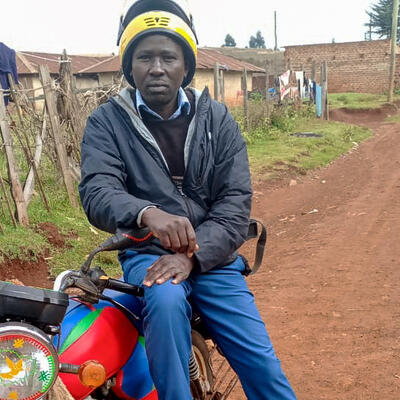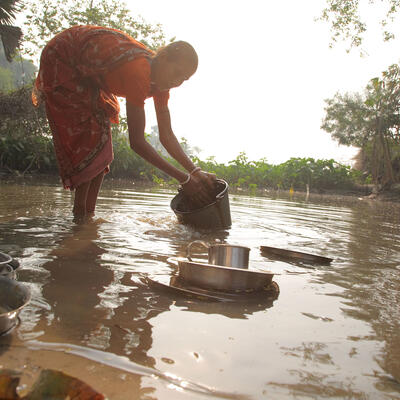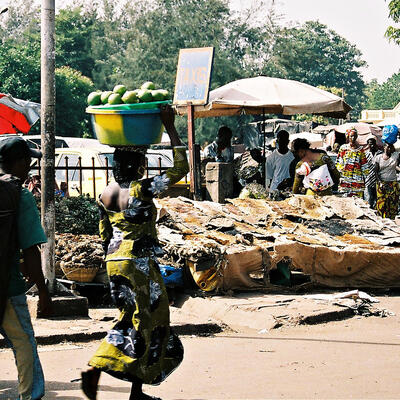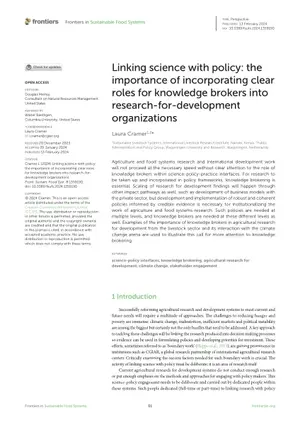
Facilitating large events – Lessons from the ict4ag Rwanda conference
 This year’s most important event in the world of agricultural information and knowledge took place from 4 to 8 November in Kigali, Rwanda.
This year’s most important event in the world of agricultural information and knowledge took place from 4 to 8 November in Kigali, Rwanda.
ict4ag brought together over 400 participants eager to share ideas, questions, and applications supporting the use of information and communication technologies (ICTs) for agricultural development.
The event was led by the Technical Centre for Agricultural and Rural Cooperation (CTA), CGIAR and various other organisations.
How does such an event get facilitated?
A team of four overall facilitators was assembled by CTA. Ewen Le Borgne was one of them, contributed by ILRI as an ‘in-kind resource’ for the conference. The other facilitators – Nancy White, Lucie Lamoureux and Nadia Manning-Thomas (formerly of ILRI and the International Water Management Institute) – were also drawn from the Knowledge Management for Development (KM4Dev) community and knew each other very well, which helped a lot for the cohesion of the facilitation group.
Prior to and throughout the event, the facilitation team worked hand in hand with CTA’s ‘Knowledge Management’ (KM) team to ensure that key insights from the sessions were captured, particularly around: what’s new (discoveries), specific case studies, lessons learned, making it happen and finally a special ‘gender lens’. Each facilitator worked with one KM team member and they covered five or six sessions from either of the three conference streams: Emerging innovations, capacity strengthening and finally enabling environment. In total, 23 sessions, with more than 100 presentations and 115 speakers were supported.
Despite ambitions to be much more, for most sessions the facilitation job entailed mostly time keeping and designing as much conversation time as possible. This latter this was a big challenge given that most sessions spanned four or five presentations over 90 minutes (and in practice often closer to 75-80 minutes).
The two main rooms of the Serena hotel were divided by partition walls to enable two parallel sessions to take place at any one time. All sessions were interpreted in French/English, adding to the challenge of group conversations with respect to the languages and the volume of noise to deal with.
During the sessions, the two facilitators present in the same room for parallel sessions often consulted each other about timing to start and end the sessions, inform each other about noise levels etc.
The facilitators also discussed together a rough process to apply – as much as possible – across all sessions to encourage noisy group conversations to happen at the same time (rather than disturb the presentations taking place in the room above the partition walls).
At the end of every day, and sometimes over lunches and breaks, facilitators met to discuss how things were progressing, to adjust the program along the way (on 5 November, lunch was postponed by nearly two hours due to a tent collapse triggered by torrential rain). Those ‘after action reviews’ were really precious to make sure that the sessions ran as smoothly as possible, that speakers and audience got as much as possible out of the sessions.
A couple of ‘synthesis sessions’ were also organised, culminating – on the last day – in a plenary session to draw out ‘next steps’ around the 20 or so different issues that came up in the conference. The facilitators had much more room to experiment and design a properly ‘interactive’ dynamic for these sessions, as opposed to organising and timing presentations around specific topics.
The facilitation team was publicly and bilaterally thanked and sometimes congratulated for their efforts, so the event worked out, despite the challenges encountered.
What are some lessons?
These have also shared with the organising team (mainly CTA staff):
- Involve the facilitators from the initial steps. In practice, a lot of the design had already been agreed at the stage that the facilitation team was pulled in. This is not ideal as facilitators have the experience of maximising the potential outputs from any event by balancing information and conversation, organisers’ and participants’ expectations, listening and interactive sessions etc.;
- Working with the KM team was useful though it worked out better in some cases than others (e.g. leading to real conversation notes as opposed to simply tweets from the session);
- Regular interactions with the coordination team prior to the event and throughout the event was extremely useful and prevented major problems from occurring (weather issues aside) but the lack of overall oversight/coordination was a hindrance at times. Using Google documents to coordinate activities among facilitators and KM people was good but having one overall coordinator present during the chats and using these collective notes would have been even better;
- The facilitators’ training (see below) worked pretty well and is something that needs to happen more often to build systemic capacity for facilitation in the region – or in this case in Rwanda. In the sessions, it was very helpful for each ‘overall facilitator’ to have someone help with setting up the room, holding the microphone, organising exercises, timing presentations etc.;
- The idea of ‘streams’ did not really resonate strongly with participants. It was useful to keep these streams at the background to capture ideas in the different sessions and the facilitation team did well to approach synthesis sessions with more flexibility, looking at individual ‘wows’ from participants and clustering them to find out what key patterns emerged;
- Having a team of facilitators (and KM people) that know each other was really instrumental in turning tensions into creative elation;
- Choosing a good venue which allows all participants to talk freely would have been great. In this respect, organising the event in a country where the organising team is not based was a challenging solution.
Developing ‘facilitation capacity’ in the region
In addition to the main event, the overall facilitation team was invited by CTA to organise a training of young Rwandan facilitators on Sunday 3 November. The training course was organised in the few weeks preceding the event, mostly via Skype exchange and last minute modifications.
On the day, about 15 young Rwandans turned up, most with some facilitation experience but some with hardly any. Of these, four were selected by CTA to support the facilitation of the main event. Each of the young ICT4Ag facilitators worked with one of the overall facilitators to try and learn how to time events, take group notes, introduce sessions and group exercises, invite participants for reflections etc. But the training day was for all participants.
During the training day, the overall facilitators led the participants through a series of exercises to demonstrate how to facilitate, touching upon items such as ‘what is facilitation?’, ‘what is the ideal profile of a facilitator?’, ‘how to deal with challenges in group facilitation?’ etc. using a variety of methods such as Open Space, World Café, Fish bowl, Metacard sorting, Peer assist and other techniques that can be found on e.g. the Knowledge Sharing Toolkit and the Liberating Structures website.
At the end of the week, the full facilitation team agreed to set up a Facebook group (closed) to keep in touch, share resources and support each other in the course of learning how to facilitate events.
There is very scarce facilitation capacity in the region and such events were a good attempt to reduce some of this gap. It is an issue that we at ILRI frequently face and we are keen to explore and support ways to structurally develop capacity for occasional and regular facilitators – in agriculture, in Africa and beyond.
















